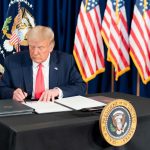In a move that could potentially baffle supporters of diplomacy as a default setting, former President Donald Trump has decided to send a letter to Iran’s Supreme Leader, Ali Khamenei. This letter offers a glimmer of hope—if only a glimmer—that Iran might consider negotiating regarding its increasingly aggressive nuclear ambitions. Trump aims to replace the frail nuclear deal thrown into the dustbin during his first term, an agreement so flawed that any attempt to salvage it should make conservatives raise their eyebrows in disbelief.
News broke swiftly through Iranian state-controlled outlets, though Khamenei’s office, presumably too busy thumbing through the pages of state propaganda, has yet to confirm receipt of the letter. It seems the age-old question of whether Khamenei will respond favorably remains unanswered—perhaps he is still waiting for the snail mail to reach him through the long-winded bureaucracy unique to such regimes. This uncertainty coupled with the crumbling Iran-Israel relations puts Western democracies on high alert, all while Khamenei maintains the farce that their nuclear program is merely for “peaceful purposes.”
The former President has made it abundantly clear that having a nuclear-armed Iran is non-negotiable for both Israel and the United States. To keep Tehran in check, Trump has been very vocal about military options being on the table, even hinting at dire consequences if negotiations fail. Ostensibly, he believes that a robust commitment to military readiness and tough sanctions coupled with this letter might just knock some sense into the minds of Iranian officials who seem to prioritize nuclear enrichment over their citizens’ welfare.
U.S. President Donald Trump sent a letter to Iran's Supreme Leader Ali Khamenei, seeking a new deal with Tehran to restrain its rapidly advancing nuclear program and replace the one he withdrew America from in his first term in office. https://t.co/oexG0LZOse
— Washington Times Local (@WashTimesLocal) March 7, 2025
Trump’s first term was marked by bold actions against Iran, such as pulling out of the nuclear deal and hitting them where it hurts economically with sanctions. Now, as he sits in his post-presidential phase, one might wonder if he thinks he can charm the Iranians with some persuasive penmanship. His remarks suggest he would prefer to avoid military action; after all, no one wants the headlines of “Trump Goes to War” printed across the globe. However, it is hard to shake the feeling that the time for bargaining has passed, especially when the opposition continues to flex its nuclear might.
Yet, despite Trump’s multilateral approach, Khamenei remains icy towards talks. He has expressed that negotiating with the perceived “enemy” might not be the wisest move. This raises the question: why should the U.S. feel compelled to earn the trust of a regime that lies through its teeth like a used car salesman? It’s clear that while Trump tries to extend an olive branch, Iran may just prefer a sword, signaling their desire to ramp up its nuclear ambitions amid a backdrop of regional chaos. With every ounce of uranium they enrich, the specter of a nuclear Iran looms ever closer, raising alarms and leaving the U.S. with limited options other than to hold Khamenei accountable for his increasingly reckless decisions.




